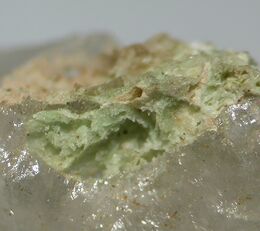Chemistry:Zaïrite
| Zaïrite | |
|---|---|
 Zaïrite from Eta-Etu, Kivu, Democratic Republic of Congo (Zaïre), (field of view 6 mm) | |
| General | |
| Category | Phosphate minerals |
| Formula (repeating unit) | Bi(Fe3+,Al)3[(OH)6|(PO4)2] |
| Strunz classification | 8.BL.13 |
| Crystal system | Trigonal |
| Crystal class | Hexagonal scalenohedral (3m) H-M symbol: (3 2/m) |
| Space group | R3m |
| Unit cell | a = 7.015, c = 16.365 [Å]; Z = 3 |
| Identification | |
| Formula mass | 646.86 g/mol |
| Color | Greenish, greenish white, yellow green. |
| Cleavage | None observed |
| Fracture | Irregular, uneven |
| Tenacity | Brittle |
| Mohs scale hardness | 4.5 |
| |re|er}} | Vitreous, resinous |
| Streak | White |
| Diaphaneity | Transparent to translucent |
| Specific gravity | 4.37 |
| Optical properties | Uniaxial(-) |
| Refractive index | nω = 1.820 - 1.830 nε = 1.810 |
| Birefringence | δ = 0.0100-0.0200 |
| Other characteristics | Occurrence: Rare mineral in the weathering zone of quartz wolframite deposits |
| References | [1][2][3] |
Zaïrite is a phosphate mineral with the chemical formula Bi(Fe3+,Al)3[(OH)6|(PO4)2].[1] The name was given from where it was locally discovered in Eta-Etu, Kivu, Congo (Zaïre) in 1975.[2]
Properties
Zaïrite crystallizes in the trigonal crystal system, which means it contains three equal horizontal axes with angles of 120° between them.[5] The mineral has a trigonal-hexagonal scalenohedron shape.[6] Zairite belongs to the uniaxial optical class. It means the light and vibrations passing through the mineral only has one direction it follows and it travels at the same speed.[5]
Occurrence
The mineral was first described from the Eta-Etu district, northern Kivu Province, Democratic Republic of the Congo (then Zaire) usually in the weathering areas of quartz wolframite deposits where it occurs with native bismuth, bismutite, quartz and mica.[3] Zaïrite is found in granite pegmatites, which are igneous coarse-grained rocks. It has also been reported from Kreuzberg Mountain in Upper Palatinate, Bavaria, Germany .[1]
References
- ↑ 1.0 1.1 1.2 Mindat.org
- ↑ 2.0 2.1 Webmineral data
- ↑ 3.0 3.1 Handbook of Mineralogy
- ↑ Warr, L.N. (2021). "IMA–CNMNC approved mineral symbols". Mineralogical Magazine 85 (3): 291–320. doi:10.1180/mgm.2021.43. Bibcode: 2021MinM...85..291W.
- ↑ 5.0 5.1 Klein, C., Dutrow, B. (2007) The 23rd edition of the Manual of Mineral Science, 131 p. John Wiley and Sons, Inc. Hoboken, New Jersey, U.S.A.
- ↑ McKie, D., McKie, C. (1986) Essentials of Crystallography. III. Blackwell Scientific Publishers, p.69
External links
 |

